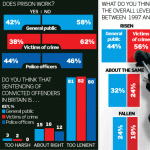The extension of probation services to offenders serving less than 12 months is to be welcomed, but how will this play out in the changing landscape of payment by results and outsourcing probation services to the private sector – Roma Hooper.
Our report, Just Results, revealed a number of serious concerns about the use of PbR in community sentences and the haste with which the government is moving. The use of PbR in this area is as yet unproven and failure to get it right would be a serious setback leading to more people in prison, higher levels of reoffending, more victims and considerably more expense – Roma Hooper.
I welcome the comments from the Secretary of State for Justice about the importance of rehabilitation and the recognition that many offenders face a multitude of complex problems in their lives. However he has missed a trick by not making a single reference to community sentences in a speech where the focus was on rehabilitation – Roma Hooper.
Quite rightly victims should expect an element of punishment within community sentences, but the evidence we have gathered from victims of lower level crimes in a recent collaboration with Victim Support confirms that they also see rehabilitation as the other key to making sure that the crime does not happen again – Roma Hooper.
New research from the charity Victim Support and the campaigning group Make Justice Work shows that most victims of crime support the use of community sentences instead of prison, but need to know more to have confidence in their effectiveness. Read the full report.
We have serious concerns about the use of PbR in community sentences and the haste with which the government is moving. By 2015 the Ministry of Justice intends to roll out PbR across the system, but the two community sentence pilots don’t even start until 2013 – Roma Hooper. Read the full report.
Roma Hooper, Director of Make Justice Work said, “MJW broadly supports the principles behind the Swift and Sure Justice White Paper. However our chief concern is that speeding up the Courts service, must not lead to offenders receiving inadequate or inaccurate assessments. Get this wrong and offenders on community sentences will not access the services and support needed, such as drug, alcohol and mental health services, to tackle their criminal behaviour.
Research commissioned by Make Justice Work into the economic benefits of providing Intensive Alternatives to Custody (IAC order) instead of short term custodial sentences reveals they could save up to £500 million over five years. Research practice at Matrix Knowledge Group conducted the research using the example of IAC orders in two pilot sites in Manchester and Bradford – Roma Hooper. Read the Executive Summary. Read the Full Report.
Commenting on figures released today by the Ministry of Justice – Criminal Justice Statistics Quarterly Update to December 2011 – Roma Hooper, Director of Make Justice Work said, “The latest figures show that from 2010 to 2011 there has been a decrease in the use of community sentences of 8.4%, with only 173,400 handed down in 2011. We know that community sentences are more effective in helping people to rehabilitate, with better figures for re-offending compared to custodial sentences – Roma Hooper
Make Justice Work – the criminal justice campaign to boost public support for a change in how Britain deals with minor offenders – has significantly enhanced its commitment to change public attitudes, following the appointment of Peter Hand to take up the new role of Deputy Director. Peter started his new role on Monday 23rd April 2012.
Ken Clarke is right – his most pressing priority is to reform the criminal justice system so it can deal with repeat offenders more effectively and at less cost to the taxpayer. The answer is staring the government in the face: intensive community sentences are proven to be tough, reduce crime, and cost a fraction of a short stay in prison, which for these offenders will never be anything other than a ‘university of crime – Roma Hooper
Community or Custody, a National Enquiry commissioned by Make Justice Work, will today (Monday) publish its Final Report.
The Enquiry finds that intensive community sentences can provide a tough and much more effective alternative to prison for persistent, low-level offenders. The Enquiry also revealed that offenders themselves find intensive community sentences much more demanding than a short spell in prison – Roma Hooper
The Justice Committee is absolutely right to demand leadership from the government in building public confidence in community sentences. Ministers know full well that short spells in prison don’t work for low-level offenders. Robust and effective community sentences must be much more widely used, if our broken criminal justice system is to be put right – David Barrie
Ministers under pressure on sentencing reforms must keep their eyes on the prize: the real problem in prisons is the ‘revolving door’ of offenders going in, out, and in again for short sentences of under a year. Parking someone in prison for a few weeks is phenomenally expensive and criminally ineffective. Ken Clarke said last month it was a ‘national scandal’ that half of all prisoners on these short sentences re-offend within a year. He was right then and it is right now that he should do something about it – Roma Hooper
The Government’s plans to reduce prison numbers must be coupled with investment in robust community alternatives. If offenders are not re-directed to effective community programmes there is a genuine risk that they will simply go on to reoffend – Roma Hooper
I am delighted to have such a distinguished group of experts working with me on this important initiative. I firmly believe that the results of our enquiry will prove to government that they can confidently cut prison numbers, cut crime and cut spending through sensible alternatives to custody – Roma Hooper



